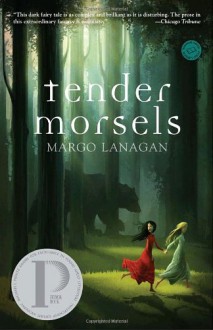
Snow White and Rose Red live with their mother in a cottage. upon them comes a bear, out of the cold, into their warmth and into their lives. he stays with them a bit; they become a sort of family, until he must go away. the girls meet a strange and irritable dwarf and save him several times. he is not grateful. later, the girls come between the dwarf and the now enraged bear. the unpleasant dwarf begs the bear to eat the girls rather than his little self. can the girls' sweet spirits get them out of this mess - are the girls able to survive? they can, and they will!
a young girl's mother dies, and she is left with her horrible father in a cottage. she is repeatedly molested and impregnated by her father. it is important that you know this, that this is a part of the book and this is a part of life, for some. a young girl loses her father and is happy for a time. a group of boys come upon her, pull her down from the chimney where she has fled, and proceed to rape her. it is important that you know this, that this is a part of the book too and this is a part of life, for some. can this much-abused girl survive? she can, and she will.
a woman writer named Margo Lanagan decided to write a book about women. she would make the book a portrait of a family of women, a family that grows bigger. she would make the book a portrait of motherhood and sisterhood and daughterhood, the challenges and the wonder and the excitement of becoming, of transforming into such roles. she would make this portrait of women a part of the greater world, so there are many voices heard, even voices of men, sympathetic men and strong, kind ones too. the book does not share the voices of those who are brutal and who destroy with their brutality; they are not worthy of having their voices heard and they are not missed. well, there is a certain voice, a harder voice: the dwarf. but his story is its own kind of tale, not the story of a brutal man but rather the story of a man small in stature and in spirit, an occasionally unkind man but not a brutal one, and one deserving of some sympathy. so this woman writer would take the fable of the sisters Snow White and Rose Red, their cottage and their mother and that dwarf and the bear-who-was-a-prince, as her template. men in the shape of bears and women in the shape of women. she would spin this tale out of prose that is light as gossamer, pliant as cotton, soft as flax, sturdy as wool. prose that sings; prose that whispers. can a woman do all these things in one book, tell all these tales, and still stay true to her goals and still stay true to the myth itself? she can, and she did.
I was once a residential counselor for runaway kids. one girl in particular, I remember her well, she came from a history of sexual abuse, like many others. she fled to the house where I worked. one night she went out wandering and upon her came a group of men. they raped this girl, this girl who had already suffered so much. was she broken though? she was, for a little while. but she came back, she healed, not completely because these kinds of wounds never heal completely, but she did heal. she was young and I know that this was still the beginning of her story. could she survive this beginning, could she survive and even thrive, one day? she could, and she did.
I thought of this girl quite a bit while reading Tender Morsels, her survival. the first 50 pages were exceedingly hard for me to read, for many others to read as well. sometimes these kinds of stories need to start hard. but they don't need to stay that way, only hard, they can expand and move beyond and transform, become something different, something more than atrocity, something bright and warm and ready to embrace those who have been hurt and who long for that bright warmth. can stories that start with such terrible things remain hard - even vengeful - while also growing softer, a soft side and a hard one, side-by-side, life is all sides, can a story juggle such things, even up until its very end? it can, and it did.

 Log in with Facebook
Log in with Facebook 





